
* Corresponding author
E-mail address: rezaronaldo@stebilampung.ac.id (R. Ronaldo)
© 2020 by the authors; licensee Growing Science.
doi: 10.5267/j.uscm.2019.8.006
Uncertain Supply Chain Management 8 (2020) 55–66
Contents lists available at GrowingScience
Uncertain Supply Chain Management
homepage:
www.GrowingScience.com/uscm
Measuring the performance of poultry business through effective supply chain management
skills
Reza Ronaldoa*
aLecturer of STEBI Lampung University, Indonesia
C H R O N I C L E A B S T R A C T
Article history:
Received July 16, 2019
Received in revised format July
30, 2019
Accepted August 11 2019
Available online
August
1
1
2019
Poultry industry is a key sector in the Indonesian economy, producing and supplying sixty five
percent of all animal protein and with ten percent employment share of labor in national
economy. Over the last thirty years, there has been an increase in production of agro food
globally. Economists agree that demand of agro product has increased due to population
growth, product consumption and the increased income. In Indonesia, poultry production has
not been able to meet the demand which makes it difficult to supply produced chicken to remote
areas. Moreover, in Indonesia, the supply chain network of poultry production does not meet
the demand of this growing sector Hence, a well-established supply chain system is required
for this sector. Large production companies should create a proper supply chain system by
integrating poultry product modularity Such an interaction between companies having SCM
skills and poultry suppliers will enhance poultry business performance. This study employed
a cross sectional research mode and designed a survey to collect data from poultry production
units in Indonesia. Results reveal that due to suppliers’ involvement and integrating product
modularity make a significant positive effect on poultry business performance. In addition, it
was also revealed that SCM skills were moderating positively in poultry business performance
which in turn helped poultry producer to develop a better supply chain network. It is
recommended that government should make appropriate polices to develop better supply chain
networks for the economic growth of country.
.
Growing Science, Canada
by the authors; licensee
20
20
©
Keywords:
Supplier involvement
Integrator involvement in Poultry
Product modularity
SCM skills
Poultry product business
performance
1. Introduction
For the last thirty years, production in livestock has grown worldwide. Economists agree that the
demand of livestock has increased due to the increase in population and higher economic growth
Delgado et al. (2020),. With regard to contracts, the economic linkages between companies and those
in the poultry farming industry have also increased exceptionally in the last twenty years. Research
studies on poultry farming in Asia and Africa (Williams et al., 2017) illustrate the growth of poultry in
the last two decades, McKenzie et al. (2018) examine the contract relationships between the poultry
growers and suppliers which has resulted in an incredible growth of poultry production and increase in
the performance of poultry business. With the growth in livestock, a need is also felt to create effective
product supply chains in order to sustain, modulate and promote livestock in particular and agriculture
and globalization also in general. Flexible supply chain agreement farming is a mutual integration
model that enables companies to have a better control over the yield of farm produce and product
modularity. The vertical contracting integration characterizes such a model, except that it excludes the

56
responsibilities which originate at various levels of production. In exchange for an assured marketplace
for his produce, the grower consents to follow a pre-determined chain process of production under the
supervision of the purchaser (Ganesh et al., 2000).
Usually the technical support and services come from the purchasers, while the growers contribute in
terms of necessary farmland and manpower for production. Mostly agriculture-sector studies are
subjective expressing concepts and phenomena of economics. These studies normally address the
queries related to general public policies, arrangements related to governance and managing
competitiveness of the industry. Similarly, the research on supply chain management is more concerned
about market demand as well as about the customers’ needs, performance of poultry business,
effectiveness, and overall operational efficiency in poultry industry (Lashari et al., 2018).
The main focus of the current research is to develop a framework of SCM raw material to the point of
production and finished good delivery to the end user market– which is a very common practice in
research related to SCM in agro industrial sector (Wadnerkar & Dalu, 2018).
This study also examines how to utilize the SCM skills and practices to bring advancement in poultry
business supply chain. It also evaluates the poultry supply chain as an agro supply chain, or as a food
supply chain with the objective to measure the supply chain business performance of poultry production
in Indonesia.
The major question raised in this study is: “Is there any well-established SCM system to assess and
evaluate the supply chain of poultry meat business performance in Indonesia through the involvement
of poultry product suppliers and by integrating poultry product modularity (Ahmad Shabudin, 2014).
Though all these issues can be handled by integrating supply chain management with poultry business
performance, the government of Indonesia is very concerned about taking measures for betterment of
supply chain management in poultry business. The government is aware that the involvement of
suppliers in poultry business has resulted in its tremendous growth (Waseem-Ul-Hameed et al., 2018).
It has also been accepted that by integrating poultry product modularity in poultry business and supply
chain management, it is easier to achieve desired growth in this business as well as growth in country’s
economy (Shamsuddoha, 2011). Any suggested model or framework as given in Figure 1 to integrate
them will be helpful in enhancing poultry business performance.
Fig. 1.
Theoretical Framework
Poultry Business
Performance
through supply
chain management
Supply chain
management
Skills
Integrator
involvement in
Poultry
Product
Modularity
Poultry Product
Supplier
involvement

R. Ronaldo /Uncertain Supply Chain Management 8 (2020)
57
The main aim in this research is to evaluate the poultry business performance indicator through supply
chain management in Indonesia. To achieve this core objective some secondary objectives were also
framed for this study.
To examine the role of involvement of supplier in poultry business performance,
To examine how integration of product modularity in poultry business enhances poultry
business performance,
To examine the mediating role of supply chain management skills in poultry business
performance.
This research study will be beneficial for Indonesian government to enhance performance of poultry
product business to integrate poultry product modularity and supply chain in this business sector.
2. Literature Review
2.1 Concept of Supply Chain Management (SCM)
The American Production and Inventory Control Society (APICS, 2008) describes the
supply chain management as a connection of chain across supplier-user industries, starting from the
point of raw material and ending on the consumption point of the final finished products (Koch et al.,
2016). The Council of SCM Professionals (CSCMP) is another leading mainstream association
comprising of SCM experts, academicians, and investigators. It defines SCM as planning and
management of all activities related to sourcing and procurement, conversion, and logistics
management. This includes delivery of a product to the grower beginning with sourcing for the raw
material, industrializing and assembling, warehousing and account tracing, entering and managing
orders, distribution over all networks, supplying to the producer, and the IT systems. The SCM
synchronizes and combines all these activities keeping them on track and engaging all parties. This
enables stockholders within the organizational process, the external stakeholders such as suppliers,
transporters and companies are indirectly engaged with this business and IT system facilitators to
remain integrated in the supply chain (Thatte & Agrawal, 2017).
2.2 Poultry Business performance Through Supply Management
In poultry business, the leading company within the SCM framework prominently arises
as the integrator. In SCM the integrator plays a vertical role in integration, being owner
of most of the feeding, breeding, slaughtering and provide all processing facilities to smoothen the
processes. It also enables to use the latest technology system and maintain stringent hygienic standards
in all its processes. It operates together various distribution networks, from supermarkets to distributors
and grocery stores. Its products are also delivered directly to eateries. The SCM integrator gains an
advantageous edge in the domestic and international markets due to the combined efforts of the whole
team. It also highlights the strategic position and the purpose of the company of providing services and
customized poultry products to enhance a continual performance of business.
2.3 Hypothesis Development
2.3.1 Poultry Product Supplier involvement:
Hao and Song (2016) assert that an important route for the success of poultry product can be achieved
through involvement of well-designed supply chain network. Yeniyurt et al. (2019) define product
supply chain as a direct participation of supplier during the product development processes. It
comprises combined product design, process engineering and production operations with major
suppliers. It also includes obtaining resources and skills, which the manufacturers do not possess but
which are vital for product innovation. While the integrator is encouraged to learn new technology
applications, poultry producers can actively influence market product performance in order to organize
supply chain network (Clauss & Spieth, 2016).

58
The core competencies of a poultry business are those things that can be performed well by a business
and that fulfills following three conditions stipulated by (Qureshi et al., 2017). First, the benefit of
customer and it should be available for customer on priority; second, its adoption must be very hard for
competitors to copy this model; and third, its use should be generalized in order to get maximum
advantage and can be useable with other products in market. Besides, there are many other core
competencies too including knowledge about technical and/or subject matters, dependable processes,
and close ties with customers and integrators (Pu & Soh, 2018). Therefore, the involvement of poultry
product supplier in a competitive market is crucial. The following hypothesis is therefore proposed
from this argument:
H1: There is a relationship between poultry product supplier involvement and poultry business
performance through supply chain management.
2.3.2 Integrator involvement in Poultry Product Modularity
The idea of modularity in educational literature was first proposed by Esteve‐Altava (2017) when he
presented the theme of almost decomposable systems. Magnusson & Lakemond (2017) state that such
decomposable systems are modular when they have a greater level of independence (loose
combination). A modular architecture is a unique form of product design in which standardized
component boundaries are used to achieve a loose combination in order to achieve the production of a
highest level on end items. This was one of the predecessors of mass customization (Vickery et al.,
2015). Zhang et al. (2019) coined the term “modularity in use” to refer to this skill and to establish the
creation as needed by considering modularity as a design strategy that avoids producing solid inter
dependencies among specific components (modules) within the product. The word “module” in this
case was defined by Allen et al. (2017) to mean a set of parts that can be detached as a unit from the
product without destroying it. Hence modularity can be understood as a systematic idea explaining the
extent to which the parts of the system may be taken apart and reorganized into new designs. According
to Gutmann et al. (1997), the poultry product modularity consists of a design with sub process that can
be put together and analyzed before being integrated. In addition, (Sanchez & Hang, 2017) stress that
it is commonly understood that poultry product modularity integrates the structure blocks that can be
merged to produce a relatively high number of product designs.
In previous literature, modularity and standardization are connected with unity and product design. The
similarity is apparent in design features and components within the product. Peleh et al. (2019) define
standardization as treating the use of common parts as essential to a modular poultry product production
design.
Hence, from the above argument, a hypothesis can be proposed:
H2: There is a relationship between Integrator involvement and Poultry Product Modularity in poultry
business performance through SCM.
2.3.3 Supply Chain Management Skills (SCMS)
In the study of economics, there are many processes which create skills that help to enhance poultry
product performance, one of them is supply chain management skills theory. According to Potts and
Kastelle (2017) the SCM skills theory it indicates that fruitful attention should be paid for the creation
of skills in the area of labor and agro food sector. the theory recognizes that creation of skills
characterized in livestock sector at the level of group of agents and whole supply chain system and
sustain this organization competencies are greater source for competitive edge in market (Schroeder et
al., 2002). The theory also states that a typical skill of poultry industry which offers organizational
decision can positively influence the level of supply chain management skills in the livestock sector.
There are organizational models that impact the level of supply chain management skills. They are
interrelated with the usual organizational processes of poultry farm houses that focus on integrated
market creation. Past scholars have written about how to increase supply chain network in food industry

R. Ronaldo /Uncertain Supply Chain Management 8 (2020)
59
and discussed the complexities of poultry organizations sector and the growth of SCM analytical in
whole network. The results of these studies reveal that poultry industry is under the threat of harsh
economic volatility of governments. The greatest challenge for governments is to offer specific
consideration to management procedures with regard to poultry production in order to increase
efficiency (Suleiman et al., 2018).
In order to maintain the quality of SCM skills, it is important for each production unit to resort to using
certain indexes of quantity until they can be applied in the production function (Hamidi, 2017). Hence,
supply chain management skills are deemed to be the most efficient mediators for managing the
supplier involvement and poultry product modularity in poultry business performance management.
Hence, the following assumptions can be stated based on these findings:
H3: There is a relationship between SCM managerial skills and poultry business performance through
supply chain management.
H4: SCM skills moderate the relationship between poultry product supplier involvement and poultry
business performance through supply chain management.
H5: SCM skills moderate the relationship between involvement of Integrator in Modularity of Poultry
Product and poultry business performance through supply chain management.
3. Research Methodology
The population of this research was all poultry producers in Indonesia and quantitative analysis method
was adopted to measure this study. This study explored the association between variables, like
integrator supplier involvement in poultry product modularity, poultry sector growth and the
moderating role of SCM skills to manage poultry production supply in Indonesia. Data was collected
through survey techniques and descriptive analytical tools were used for analysis. The sample chosen
were commercial level poultry producers registered with The Indonesia Feed and Livestock Sector
(IFLS) of Indonesia in three provinces. The instrument used for data collection was a questionnaire
which consisted of an introduction, the research purpose and questions about variables of the study like
integrator involvement for poultry product modularity, supplier involvement, moderating role of SCM
skills and characteristics of individual poultry producers and relevant about poultry production.
3.1 Sampling Method
The identification of population is the core to select a sample In this study, the sample chosen comprised
a group of people and organization which were involved in the poultry production at a commercial
level and are responsible to supply them in the final market. The rationale to choose the poultry
production segment was because of its highest distribution of chicken and other poultry products in the
market (Shabudin, Mohtar, & Mad Lazim, 2015). The addresses and names of chicken contractors were
taken from public authority of Indonesian Feed and Livestock Sector (IFLS). For the measurement of
construct a multi item measurement scale for hypothesis tests was adopted which was borrowed from
prior researches. A 5-point Likert scale was used for the measurement of questionnaire items which
start with (1) as very low and (5) as very high.
3.2 Data Collection
Data was mainly collected through Emails. A proper mail was drafted stating the importance of research
explaining the objectives of the study. A cover letter was also appended with the mail to enhance the
response rate.
3.3 Sample Size
The sample size was determined on the recommendations of Comrey & Lee, 1992 for studies on
inferential statistics. As per their recommendations, under fifty (50) sample size was not up to the mark
and considered weaker and sample of 100 was weak, sample of 200 respondents was considered

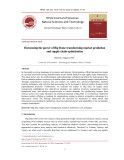


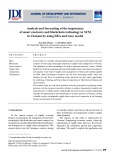
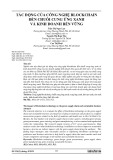

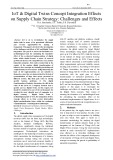
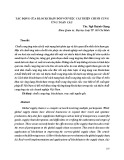

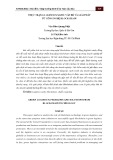







![Đề kiểm tra Quản trị logistics [mới nhất]](https://cdn.tailieu.vn/images/document/thumbnail/2025/20251015/2221002303@sv.ufm.edu.vn/135x160/35151760580355.jpg)
![Bộ câu hỏi thi vấn đáp Quản trị Logistics [năm hiện tại]](https://cdn.tailieu.vn/images/document/thumbnail/2025/20251014/baopn2005@gmail.com/135x160/40361760495274.jpg)






